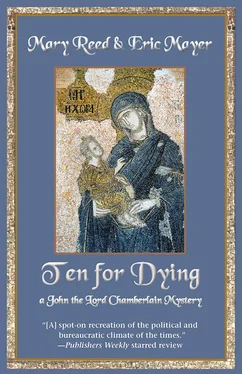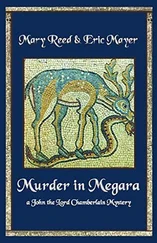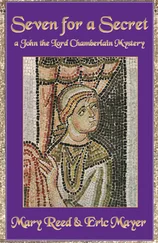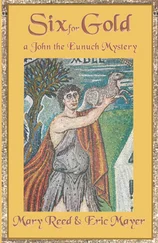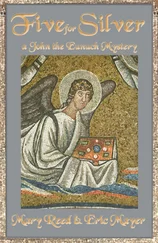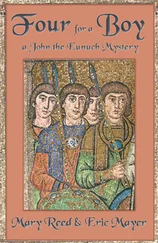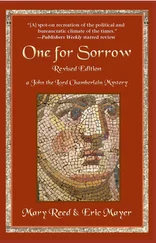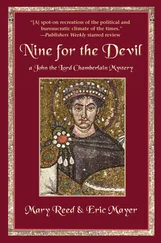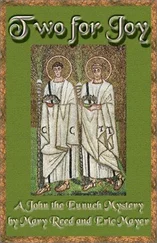Mary Reed - Ten for Dying
Здесь есть возможность читать онлайн «Mary Reed - Ten for Dying» весь текст электронной книги совершенно бесплатно (целиком полную версию без сокращений). В некоторых случаях можно слушать аудио, скачать через торрент в формате fb2 и присутствует краткое содержание. Год выпуска: 2014, Издательство: Poisoned Pen Press, Жанр: Исторический детектив, на английском языке. Описание произведения, (предисловие) а так же отзывы посетителей доступны на портале библиотеки ЛибКат.
- Название:Ten for Dying
- Автор:
- Издательство:Poisoned Pen Press
- Жанр:
- Год:2014
- ISBN:нет данных
- Рейтинг книги:4 / 5. Голосов: 1
-
Избранное:Добавить в избранное
- Отзывы:
-
Ваша оценка:
- 80
- 1
- 2
- 3
- 4
- 5
Ten for Dying: краткое содержание, описание и аннотация
Предлагаем к чтению аннотацию, описание, краткое содержание или предисловие (зависит от того, что написал сам автор книги «Ten for Dying»). Если вы не нашли необходимую информацию о книге — напишите в комментариях, мы постараемся отыскать её.
Ten for Dying — читать онлайн бесплатно полную книгу (весь текст) целиком
Ниже представлен текст книги, разбитый по страницам. Система сохранения места последней прочитанной страницы, позволяет с удобством читать онлайн бесплатно книгу «Ten for Dying», без необходимости каждый раз заново искать на чём Вы остановились. Поставьте закладку, и сможете в любой момент перейти на страницу, на которой закончили чтение.
Интервал:
Закладка:
Chapter Three
Theodora’s shade was not waiting for Felix and John at the entrance to the Church of the Holy Apostles.
Not that Felix had truly expected her, although, he had to admit, his imagination had bedeviled him during their ride along the Mese.
Leaving their horses with one of the excubitors arrayed around the church, he and John made their way upstream against a flood of worshippers pouring out into the sunshine after morning prayer. In the nave, where they found the priest Basilius, beams of sunlight dropped through wisps of pungent incense, sparkling here off a silver lamp, there from jewels set in a gilded reliquary.
Christian ostentation had never impressed Felix like John, a secret follower of the soldier’s austere god Mithra. But recently, battered by the changes at the palace, he had felt a guilty appreciation, an attraction, not to the gold and gems and fine marbles in the churches, but to their solidity. Theodora was dead, John would soon be in exile, his own life had careened past with shocking speed, but these monuments to the Christian god were ever-present, in every street. Wherever you stood in Constantinople you could see a glittering dome, a cross. Endlessly built and replaced, the churches, and perhaps what they represented, would forever be here.
Basilius did not appear to be taking any comfort from his surroundings. Short and slight, of indeterminate age, he looked distraught as he spoke to a shabbily dressed man and woman beside the marble-columned templon guarding the sanctuary beyond. Lingering worshippers, Felix guessed.
He strode up to Basilius, accompanied by John. Both men towered above the priest, whose robes were disheveled.
“Ah, Captain. Thank you for coming. I’ve already spoken to one of the City Prefect’s men. I was told the emperor would be sending someone as well.” Basilius offered John a nervous glance, started to address him, then, instead, handed Felix a green stone, carved into the shape of a beetle. “Here is the scarab found on Theodora’s tomb. The frogs have been removed from the mausoleum.” He absently wiped his hand on his vestments.
Felix peered at the scarab, turned it over, looking for what, he couldn’t say. The ancient talisman, crude and dull, seemed profoundly out of place amid the magnificent trappings of Christianity. “Do you have any idea who might be responsible for this?”
Basilius shook his head.
Felix gave John an inquiring glance, but John said nothing.
“We’ll need to examine the mausoleum,” Felix said. “But what about the relic that was stolen?”
Basilius appeared ready to burst into tears. “One of the empire’s most sacred and powerful relics, the fragment of the burial cloth of our Lord’s mother!”
The words took the air out of Felix like a blow to the stomach. Surely not the Virgin’s shroud? He knew of it, of course. Who in the city did not? Constantinople was said to be under its protection. A fine thing if it couldn’t even protect itself from thieves.
“You saw the theft?”
“No. I have witnesses.” Basilius indicated the poorly dressed couple whom Felix had taken for worshippers. “This is Mada, who serves the Lord in the capacity of church cleaner, and Peteiros, her husband, who takes care of lighting the lamps and polishing the holy vessels.”
The couple gave feeble smiles, bowed, and moved forward a few paces. They were of late middle age, sturdy but pallid-skinned, suggesting farmers who hadn’t seen the sun in years.
“Please tell the captain and his companion what you told me,” Basilius instructed them.
Felix noted the priest’s description of John as merely the captain’s companion. Two weeks ago he had been the feared and respected Lord Chamberlain. Now the whole city knew of his fall from imperial grace. It was obvious John’s presence made Basilius uneasy. People kept their distance from Justinian’s enemies if they knew what was good for them.
Mada clasped her red and knobby hands together and began in a faltering voice. “We came here early this morning to attend to our duties, sir. My husband was refilling the lamps. They were burning low and the church was full of shadows. And it seemed wrong, somehow. We got to work…”
The woman spoke with a faint, rough accent Felix could not place.
She shivered and looked around fearfully. “But after a while the church felt different. There was a strange smell, a bad smell, overpowering the incense, and suddenly the walls began to move.”
“Move?” Felix asked.
The woman wrung her clasped hands. “Yes. The Lord is my witness. It was as if the stone had turned to water. Like a waterfall. Yet my mouth felt as dry as the desert. And then my husband fell down.”
“That is true, sir,” Peteiros confirmed. “I know how a fly must feel when a man brings his hand down on it. One moment I was standing here and the next-”
“Oh, Peteiros, you do go on,” scolded his wife.
“But it is true, sirs. All turned black and I went straight to the floor.” He pointed to a large bruise on his forehead. “Does this mark lie?”
Felix looked to John, who did not appear inclined to assist in the questioning. “So what happened then?”
“I was helping him get up as best I could,” Mada said. “I was feeling very unwell myself, and then I heard the sound of running feet. I looked around. There were two of them, keeping to the shadows, they were. It was hard to see, what with the walls bubbling and trembling, but it seemed-”
“Demons, sirs.” Interrupted Peteiros. “Hideous demons!”
Felix thought the priest looked faint. “Demons? My orders mentioned frogs and a scarab. Nothing was said about demons.”
“I only caught a glimpse of them,” Mada admitted, “between the shadows and my head spinning and helping my husband, but they had to be demons. There was that smell I mentioned, surely it was the smell of demons?”
“That’s right,” her husband confirmed. “The unholy stink of them is still in my nostrils.”
Felix sniffed the air but discerned only incense, predominately frankincense. He had noticed that the breath of the cleaning woman and her husband was particularly foul. He suspected they had both been drinking the night before. “Are you sure this dreadful odor is in your nose and not just in your head?”
“I wish it were only in my head, sir.”
“And then? What did these demons do?”
Mada waved a claw-like hand in the direction of several elaborate reliquaries sitting on a table in front of the templon. “They ran over there. To where the holy objects are kept. When they raced away one of them carried something that glowed white in the shadows.”
“Like a halo,” added Peteiros.
Felix had seen the shroud when it was displayed during holy days. In truth it was merely a piece of the shroud, a stained scrap of cloth.
Basilius walked over to the reliquary. Felix managed to compose himself and followed.
The priest’s hand shook as he pointed out how the lock on the dome of a miniature, gem-encrusted Great Church had been forced.
To Felix’s consternation John remained adamantly silent. “What do you think, John?” he hinted.
“A very small lock to secure such a great treasure,” John replied.
Basilius shook his head. “The shroud is usually housed at the Church of the Virgin and well-guarded indeed. But it was brought here temporarily for the empress’ funeral. Who could have guessed anyone would engage in such desecration? I sent one of my younger assistants out to find a patrol but by the time he brought someone back it was far too late.”
“It’s obvious someone decided to take advantage of the shroud being kept here without adequate security,” Felix observed. He lifted the golden dome and peered down into the reliquary’s interior. A thread lay coiled there. Did even a minute bit of a sacred object hold divine power? If the Christian god was all powerful, why not? But if that god was present everywhere, as the Christians claimed, what was the point of relics anyway?
Читать дальшеИнтервал:
Закладка:
Похожие книги на «Ten for Dying»
Представляем Вашему вниманию похожие книги на «Ten for Dying» списком для выбора. Мы отобрали схожую по названию и смыслу литературу в надежде предоставить читателям больше вариантов отыскать новые, интересные, ещё непрочитанные произведения.
Обсуждение, отзывы о книге «Ten for Dying» и просто собственные мнения читателей. Оставьте ваши комментарии, напишите, что Вы думаете о произведении, его смысле или главных героях. Укажите что конкретно понравилось, а что нет, и почему Вы так считаете.
